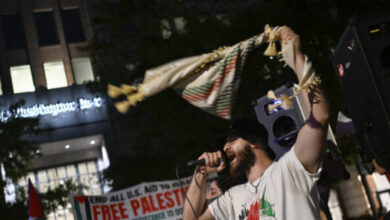Trending treat ‘Dubai chocolate’ — but who owns the name? – DW – 12/10/2024

On a cold December evening, scores of Christmas market revelers, bundled up in coats, scarves and hats, are crowding around a stall that reflects Cologne’s landmark cathedral in its glass panels. A sweet aroma fills the air and people are speaking German, French, English and Dutch. Behind the counter, cashews and dried fruits are piled high.
Most visitors’ eyes, however, are drawn to the centerpiece of the display: stacks of handcrafted milk chocolate bars that have been hand-painted green and are known as “Dubai chocolate.”
Initially a social-media phenomenon, the crunchy delicacy has now made its way to traditional German Christmas markets like the one in Cologne.
The stall is run by Kischmisch Manufaktur, a local delicatessen. Its founder, Nasratullah Kushkaki, says Dubai chocolate is currently his top seller, and often sells out despite a price of €7.50 ($7.96) for 100 grams.
Kushkaki isn’t the only one capitalizing on the viral trend, with Christmas market vendors all over Germany now featuring tasty inventions like Dubai chocolate crepes, hot Dubai chocolate and Dubai chocolate waffles. But can anyone just use the term “Dubai chocolate” for their products?
Originating in the Middle East
As the name suggests, Dubai chocolate likely originated in Dubai, in the United Arab Emirates (UAE). Sarah Hamouda is credited as its creator. She is the founder of Dubai-based Fix Dessert Chocolatier and a social media influencer. The entrepreneur shared on Instagram that it all began with her cravings during pregnancy.
Her husband was unable to find the perfect dessert for her in Dubai, so she invented one herself: crisp chocolate filled with pistachio cream and crunchy kadayif pastry threads. Soon the treat went viral on TikTok.
Is the name protected?
Nearly anyone can recreate this trendy chocolate treat, but can they call it Dubai chocolate?
Origin-based product names can be protected globally as a trademark. For instance, the term Champagne is reserved for sparkling wine from France’s Champagne region.
The Geneva Act of the Lisbon Agreementis an international treaty involving 30 countries, including the EU, that basically protects products based on the geographical name of a country, region or locality where a product is made.
But as patent attorney Rüdiger Bals explains this protection applies only to countries that are part of the treaty — and the UAE is not a member. That means they cannot protect the term Dubai chocolate under this agreement, he told DW.
Still, bilateral agreements between countries could secure protection. The UAE could “theoretically register Dubai chocolate as a geographic indication within its jurisdiction,” Germany’s Patent and Trademark Office told DW in a statement, and then apply for protection in the EU.
A popular brand name
Bakeries, patisseries, influencers and even large chocolate manufacturers like Swiss company Lindt, meanwhile, are embracing the trend and selling their own products under the name Dubai chocolate.
In Germany alone, there are 19 active trademark applications for sweets with Dubai in their name, according to the patent office. Across Europe, there were more than 30 such applications as of December 4, 2024.
However Bals doubts that these applications will be successful because “trademark law examines whether a term is distinctive, and the term Dubai chocolate as such likely lacks sufficient uniqueness,” he said.
Dubai chocolate has become a generic term for pistachio cream-filled chocolate with kadayif, similar to the term chocolate Santa Claus, which also cannot be trademarked because it is widely understood as a general term for a chocolate figure shaped like Santa Claus.
Bals also thinks that simply adding a manufacturer’s name is unlikely to provide enough distinction.
Some manufacturers tried to register variations, for example the German YouTuber Kiki Aweimer with the name “Kiki’s Dubai Chocolate.” But since Aweimer’s chocolate is likely not different enough from the Dubai chocolate of other manufacturers, the product will probably not be able to establish itself as a brand.
According to Bals, using the term Dubai chocolate could, moreover, create “issues of misleading representation,” as trademark laws reject terms that “imply a false geographic connection.” That means calling a product Dubai chocolate may be misleading if no ingredients — like chocolate or pistachios — are actually sourced from Dubai.
Creator silent despite a global craze
The original creator, Sarah Hamouda and her company Fix Dessert Chocolatier, could theoretically register the term Dubai chocolate as a trademark in Germany or the EU. DW reached out to the company about potential plans for protection but received no response by the time of writing.
Despite the unresolved trademark issues, one thing is certain: this year, countless Dubai chocolate bars will be enjoyed worldwide.
For Nasratullah Kushkaki, the chocolate frenzy is a delight that came at the right moment. As the sun sets over the Christmas market in Cologne, more people are lining up at his stall eager for a little chocolate luxury.
This article was originally written in German.




